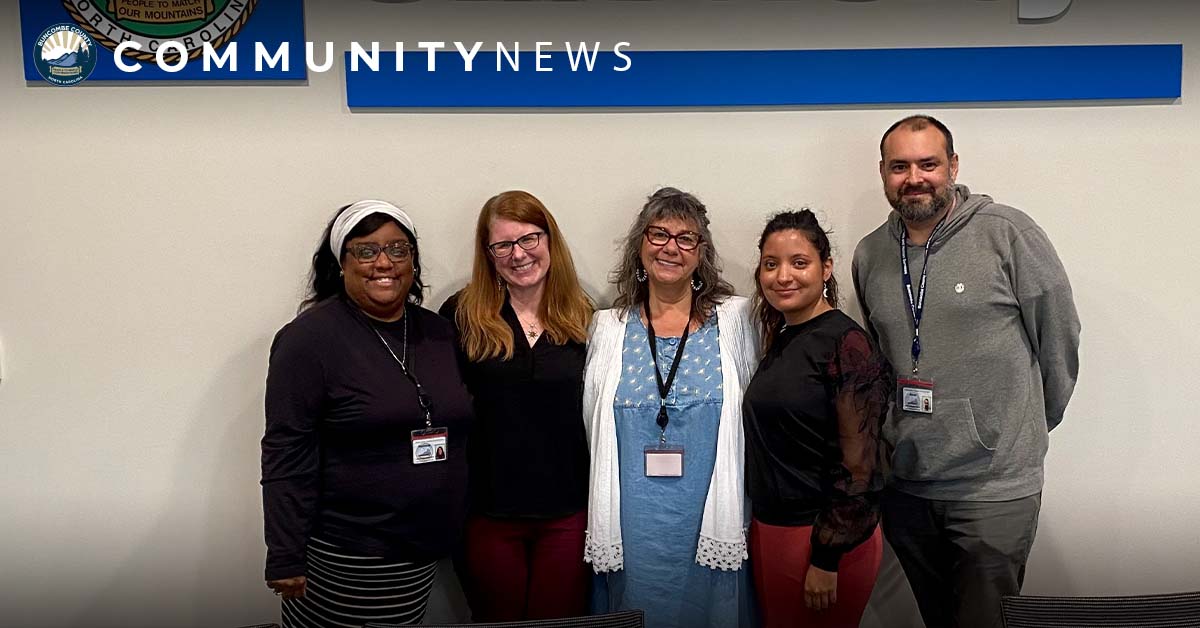
Pictured above: From left, Rasheeda McDaniels, Buncombe CAPE, Susan Clifford, Language Access Coordinator for Building Integrated Communities, Tammy Stewart, Compliance Officer, Carolina Siliceo Perez, BCSO, and Aaron Vidaurri, Language Access Coordinator (Not pictured Rocio Quintero, CAPE)
From Institute for the Study of the Americas at UNC-Chapel Hill:
Chapel Hill, North Carolina, June 26, 2023 --- On January 27, 2023, Building Integrated Communities (BIC) launched its inaugural class of the Language Access Collaborative, bringing together teams of North Carolina local governments and community-based organizations to build bridges of communication.
Nine local governments partnered with community-based organizations to form teams of Collaborative participants in Apex, Buncombe, Concord, High Point, Morrisville, New Hanover, Raleigh, Wilmington, and Winston-Salem.
Through a combination of virtual workshop exchanges, in-person summits, and technical assistance, teams are participating in a hybrid, interactive Language Access Collaborative course designed to build capacity for NC local governments to communicate with residents in community languages. Community organizations are part of the teams and provide expertise and guidance to cities, towns, and counties.
As part of the Collaborative, teams will:
- Learn about promising practices from immigrant and language access leaders and practitioners
- Conduct internal assessments and collect community data
- Design a language access plan for local government
- Initiate implementation of recommendations from that plan.
The Language Access Collaborative, which is funded by the Blue Cross and Blue Shield of North Carolina Foundation, is part of BIC at the Institute for the Study of the Americas (ISA) at UNC-Chapel Hill, one of the oldest centers in the nation for the study of Latin America.
“Here at ISA, we view language access as an important first step towards civic engagement, representative leadership, and public understanding of North Carolina’s Latin American history and heritage,” said Dr. Hannah Gill, Associate Director of ISA. “Shifting patterns of migration have direct implications on the daily life of communities across North Carolina, and the Language Access Collaborative strengthens our efforts to build capacity, develop expertise and experience, and inform public policy.”
“We can already see the practical benefits of creating this opportunity for cities and counties to collaborate with community-based agencies and each other through an exchange of ideas, experiences, and models of language access,” Gill added.
Team members point to the benefits of deeper relationships formed through language access as a way to promote equity and justice.
Rasheeda Hall, Community Development Specialist and leader of Buncombe County’s Community Engagement Team, shares how the County’s relationship with its community partner, PODER Emma, has been strengthened as part of this Collaborative: “PODER Emma and Buncombe County's partnership has been a solid and productive collaboration for years. PODER Emma has been genuine in their practice and taught us the importance of honoring one's native language. They have taught us a lot about social justice and the injustices that their communities have experienced. They continue to teach us how Government can genuinely make changes by being transparent and diligently working together with integrity.”
Carolina Siliceo Perez, Communications and Community Outreach Coordinator with the Buncombe County Sherriff’s Office further shares: “Maintaining and supporting safe communities is one of the most important functions of local and county government. No one should ever have to live in fear or with limited access to support and safety. Helping to drive the conversation around language justice and equity is one way to support the right of our younger community members to experience their childhood without the additional weight of interpreting for family members in often difficult and challenging circumstances for their age.”
By working with community agencies to create language access plans, policies, and procedures, local governments in the Collaborative are providing meaningful language access, hiring bilingual staff, and ensuring quality interpretation/translation services for residents who speak languages other than English.
This year-long Language Access course will culminate in January 2024 with a public presentation of the 9 teams’ language access plans. To learn more about the Language Access Collaborative, click here or contact Susan Clifford, Language Access Coordinator, at Susan.Clifford@unc.edu.